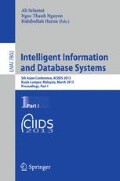Abstract
Due to the growing amount of digital data stored in relational databases, more new approaches are required to learn relational data. The DARA algorithm is designed to summarize data and it is one of the approaches introduced in relational data mining in order to handle data with one-to-many relations. The DARA algorithm transforms data stored in relational databases into a vector space representation by applying the information retrieval theory. Based on the experimental results, the DARA algorithm is proven to be very effective in learning relational data. However, DARA suffers a major drawback when the cardinalities of attributes are very high because the size of the vector space representation depends on the number of unique values that exist for all attributes in the dataset. This paper investigates the effects of discretizing the magnitude of terms computed and applying a feature selection process that reduces the cardinalities of attributes of the relational datasets on the predictive accuracy of the overall classification task. This involves the task of finding the best set of relevant features used to summarize the data, in which the feature selection processed is performed based on the magnitude of terms computed earlier. Based on the results obtained, it shows that the predictive accuracy of the classification task can be improved by improving the quality of the summarized data. The quality of the summarized data can be enhanced by appropriately discretizing the magnitude of terms computed earlier and also appropriately selecting only a certain percentage of the attributes.
Access this chapter
Tax calculation will be finalised at checkout
Purchases are for personal use only
Preview
Unable to display preview. Download preview PDF.
References
Quinlan, J.R.: Learning Logical Definitions from Relations. Machine Learn. 5(3), 239–266 (1990)
Mitra, P., Murthy, C.A., Pal, S.K.: Unsupervised feature selection using feature similarity. Pattern Analysis and Machine Intelligence 24(3), 301–312 (2002)
Miller: Subset Selection in Regression, 2nd edn. Chapman & Hall (2002)
Quinlan, R.J.: C4.5: Programs for Machine Learning. Morgan Kaufmainn Series in Machine Learning (1993)
Srinivasan, A., Muggleton, S., Sternberg, M.J.E., King, R.D.: Theories for Mutagenicity: A Study in First-Order and Feature-Based Induction. Artificial Intelligence 85(1-2), 277–299 (1996)
Harigan, J.A.: Clustering Algorithms. John Wiley, New York (1775)
Witten, I.H., Frank, E.: Data Mining: Practical Machine Learning Tools and Techniques with Java Implementations. Morgan Kaufmann (1999)
Alfred, R.: The Study of Dynamic Aggregation of Relational Attributes on Relational Data Mining. In: Alhajj, R., Gao, H., Li, X., Li, J., Zaïane, O.R. (eds.) ADMA 2007. LNCS (LNAI), vol. 4632, pp. 214–226. Springer, Heidelberg (2007)
Alfred, R.: Optimizing feature construction process for dynamic aggregation of relational attributes. J. Comput. Sci. 5, 864–877 (2009), doi:10.3844/jcssp.2009.864.877
Alfred, R.: Summarizing relational data using semi-supervised genetic algorithm-based clustering techniques. Journal of Computer Science 6(7), 775–784 (2010)
Alfred, R.: Feature transformation: A genetic-based feature construction method for data summarization. Computational Intelligence 26(3), 337–357 (2010)
Salton, G., Michael, J.: McGill, Introduction to Modern Information Retrieval. McGraw-Hill Inc., New York (1986)
Karunaratne, T., Bostrom, H., Norinder, U.: Pre-Processing Structured Data for Standard Machine Learning Algorithms by Supervised Graph Propositionalization – a Case Study with Medicinal Chemistry Datasets. In: Ninth International Conference on Machine Learning and Applications, pp. 828–833 (2010)
Muggleton, SH.: Learning Stochastic Logic Programs, In Proceedings of the AAAI 2000 Workshop on Learning Statistical Models from Relational Data, Technical Report WS-00-06, pp.36-41 (2000)
Zhang, C., Wang, J.: Multi-relational Bayesian Classification Algorithm with Rough Set. In: 7th Intl. Conf. Of FSKD 2010, pp. 1565–1568 (2010)
Li, Y., Luan, L., Sheng, Y., Yuan, Y.: Multi-relational Classification Based on the Contribution of Tables. In: International Conference on Artificial Intelligence and Computational Intelligence, pp. 370–374 (2009)
Cao, P., Hong-yuan, W.: Multi-relational Classification on the Basic of the Attribute Reduction Twice. Communication and Computer 6(11), 49–52 (2009)
He, J., Liu, H., Hu, B., Du, X., Wang, P.: Selecting Effective Features and Relations For Efficient Multi-Relational Classification. Computational Intelligence 26(3), 1467–8640 (2010)
Guo, H., Herna, L.: Viktor: Multi-relational classification: a multiple view approach. Knowl. Inf. Systems 17, 287–312 (2008)
Wrobel, S.: Inductive Logic Programming for Knowledge Discovery in Databases: Relational Data Mining, pp. 74–101. Springer, Berlin (2001)
Emce, W., Wettschereck, D.: Relational instance-based learning. In: Proceedings of the Thirteenth International Conference on Machine Learning, pp. 122–130. Morgan Kaufmann, San Matco (1996)
Kirsten, M., Wrobel, S., Horvath, T.: Relational Distance Based Clustering. In: 8th International Conference on Inductive Logic Programming, pp.261–270 (1998, 2001)
Woznica, A., Kalousis, A., Hilorio, M.: Kernel-based distances for relational learning. In: Proceedings of the Workshop on Multi-Relational Data Mining at KDD (2004)
Getoor, L.: Multi-relational data mining using probalilistic relational models: research summary. In: Proceedings of the First Workshop in Multi-relational Data Mining (2001)
Author information
Authors and Affiliations
Editor information
Editors and Affiliations
Rights and permissions
Copyright information
© 2013 Springer-Verlag Berlin Heidelberg
About this paper
Cite this paper
Kheau, C.S., Alfred, R., Keng, L.H. (2013). Dimensionality Reduction in Data Summarization Approach to Learning Relational Data. In: Selamat, A., Nguyen, N.T., Haron, H. (eds) Intelligent Information and Database Systems. ACIIDS 2013. Lecture Notes in Computer Science(), vol 7802. Springer, Berlin, Heidelberg. https://doi.org/10.1007/978-3-642-36546-1_18
Download citation
DOI: https://doi.org/10.1007/978-3-642-36546-1_18
Publisher Name: Springer, Berlin, Heidelberg
Print ISBN: 978-3-642-36545-4
Online ISBN: 978-3-642-36546-1
eBook Packages: Computer ScienceComputer Science (R0)

